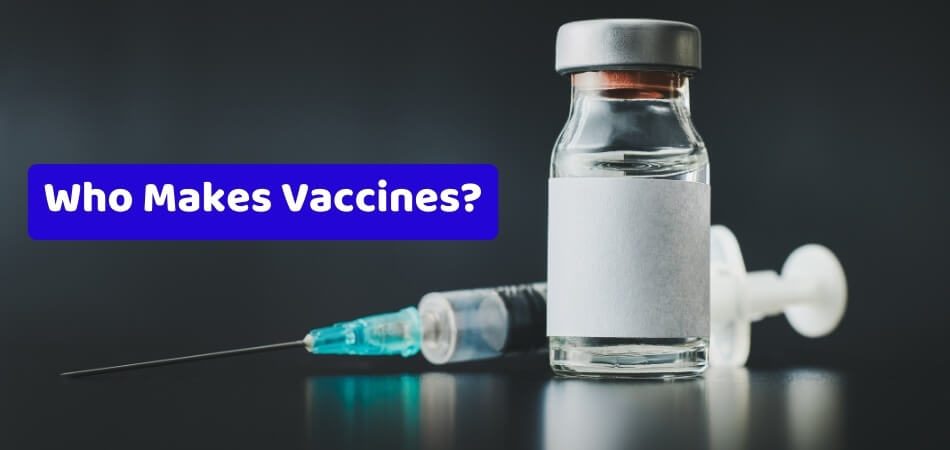Vaccines are a cornerstone of modern medicine and have saved countless lives. But who is responsible for the development and manufacturing of these life-saving medicines? In this article, we will explore the answer to the question “Who makes vaccines?” and the complex process involved in bringing a vaccine to market. From the scientists in the lab to the regulators ensuring safety, learn more about the people who make vaccines a reality.
Vaccines are created by pharmaceutical companies, research institutions and universities around the world. The U.S. Food and Drug Administration (FDA) approves and regulates vaccines in the United States. The Centers for Disease Control and Prevention (CDC) provides guidance on the use of vaccines and works with the FDA to ensure that vaccines are safe and effective.
Who Makes Vaccines?
Vaccines are critical for protecting public health, and the production and distribution of vaccines is an incredibly complex process. Vaccines are made by pharmaceutical companies, known as “vaccine manufacturers”. The manufacturers must ensure that each vaccine is safe, effective, and of the highest quality.
Manufacturing Process
The vaccine manufacturing process involves a number of steps, including:
- Development: Vaccine manufacturers develop the recipe for the vaccine, which involves selecting the right ingredients and determining the right dosage.
- Testing: The vaccine is tested extensively to ensure it is safe and effective.
- Production: The vaccine is produced in a sterile environment and packaged for distribution.
- Storage: Vaccines must be stored properly in order to maintain their safety and effectiveness.
- Distribution: Vaccines are then distributed to healthcare providers, pharmacies, and clinics.
Regulation and Oversight
The vaccine manufacturing process is closely regulated by the U.S. Food and Drug Administration (FDA), which inspects the facilities where vaccines are produced, reviews the data from clinical trials, and approves vaccines for sale and distribution. Vaccine manufacturers must also comply with Good Manufacturing Practices (GMPs) to ensure that their products are safe and effective.
Major Vaccine Manufacturers
The major vaccine manufacturers in the U.S. include:
- Pfizer
- Merck
- Sanofi Pasteur
- GlaxoSmithKline
- AstraZeneca
These companies are responsible for producing and distributing the majority of vaccines in the U.S. and around the world. They have teams of scientists, researchers, and technicians who work to develop and test new vaccines, as well as produce existing ones.
Few Frequently Asked Questions
Who Makes Vaccines?
Q1. Who is responsible for making vaccines?
A1. Vaccines are made by pharmaceutical companies, often in collaboration with researchers and public health organizations. Pharmaceutical companies use their resources to develop and manufacture vaccines that can be used to protect against a wide range of infectious diseases, including some of the world’s most deadly. Vaccines are also made by government agencies, research institutes, and universities. Once the vaccine has been tested and approved by regulatory agencies, it is then produced and distributed to physicians and health care providers for use in the population.
What are the steps involved in making a vaccine?
A2. Vaccine development involves several steps. First, scientists conduct research to identify a particular virus or bacteria, then they work to develop a safe and effective vaccine to protect against it. This process often involves making several batches of a vaccine and testing them in laboratory animals before human trials can begin. Once a vaccine has been tested and approved, it is then manufactured and packaged for distribution. Finally, it is distributed to health care providers and administered to the public.
What is the role of the FDA in making vaccines?
A3. The US Food and Drug Administration (FDA) is responsible for ensuring the safety and efficacy of vaccines before they can be approved for use in humans. The FDA reviews the data submitted by pharmaceutical companies, such as clinical trial results, to ensure that the vaccine meets their safety and efficacy requirements. Once approved, the vaccine is then labeled according to the FDA-approved indications.
What kind of regulations are in place for making vaccines?
A4. Vaccines are subject to a number of regulations to ensure their safety and efficacy. For example, all vaccines must meet certain standards for purity, potency, and quality before they can be approved for use in humans. Additionally, vaccines must be manufactured in accordance with good manufacturing practices (GMPs) to ensure a consistent and effective product. Finally, regulatory agencies such as the FDA must approve a vaccine before it can be used in the population.
How are vaccines tested before they are approved?
A5. Before a vaccine can be approved for use in humans, it must undergo a rigorous testing process. This process typically involves conducting clinical trials in laboratory animals and humans to assess safety and efficacy. During the clinical trial process, the vaccine is tested to determine whether it can effectively protect against the targeted virus or bacteria. Additionally, the safety of the vaccine is evaluated to ensure that it does not cause any adverse reactions in the people who receive it.
What is the role of the World Health Organization in making vaccines?
A6. The World Health Organization (WHO) is an international organization that works to promote and protect health around the world. The WHO works closely with pharmaceutical companies and other organizations to develop and distribute vaccines that can protect against a wide range of infectious diseases. The WHO also provides guidance and support on vaccine development, manufacturing, and distribution, and plays a key role in helping countries access and use vaccines to protect their populations.
In conclusion, vaccines are one of the most important medical inventions of all time, and the process of making them is a highly complex and technical one. Vaccines are created by teams of researchers, scientists, and medical professionals all working together to ensure that the vaccine is safe and effective. With the help of these dedicated professionals, vaccines have saved countless lives and continue to be a vital part of modern medicine.
